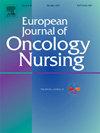心理社会调节在骨髓增生性肿瘤患者生活质量中的作用。
IF 2.7
3区 医学
Q1 NURSING
引用次数: 0
摘要
目的:骨髓增生性肿瘤(mpn)可引起高症状负担,对生活质量(QoL)产生负面影响。了解患者应对疾病的方式以及这如何影响他们的生活质量是很重要的,但实际上是未知的。本研究的目的是探讨心理社会适应是否以及如何影响MPN患者的生活质量。方法:对338名MPN患者进行了一项纵向研究,以调查心理社会适应基线测量是否以及如何预测6个月后的生活质量结果。对疾病的心理社会适应通过应对、自我管理、弹性和疾病认同(II)进行操作。我们检验了问题解决应对、自我管理、弹性、II亚量表接受和充实得分高,II亚量表拒绝和吞噬得分低与生活质量得分高相关的假设。我们进行了多层次回归分析,包括社会人口统计学和疾病相关变量以及基线生活质量作为控制变量。结果:ii亚量表吞噬对生活质量(QoL)的负面影响最为显著。结论:本研究的结果说明了吞噬对患者生活质量的显著不利影响,强调了提供心理社会指导以减轻患者被疾病压倒的感觉的重要性。本文章由计算机程序翻译,如有差异,请以英文原文为准。
The role of psychosocial adjustment in the quality of life of patients with myeloproliferative neoplasms
Purpose
Myeloproliferative neoplasms (MPNs) can cause a high symptom burden that negatively affects quality of life (QoL). The way patients deal with their disease and how this impacts their QoL is important to understand, yet virtually unknown. The aim of this study is to investigate whether and how psychosocial adjustment affects QoL in MPN patients.
Methods
A longitudinal study was conducted in 338 patients with MPN to investigate whether and how baseline measurements of psychosocial adjustment could predict QoL outcomes six months later. Psychosocial adjustment to illness was operationalized by: coping, self-management, resilience and illness identity (II). We tested the hypotheses that high scores on respectively problem-solving coping, self-management, resilience, II-subscales acceptance and enrichment, and low scores on II-subscales rejection and engulfment are associated with high scores on QoL. We performed a multiple hierarchical regression analysis including sociodemographic and disease-related variables and baseline QoL as control variables.
Results
II-subscale engulfment had the most pronounced negative impact on QoL (β.47, p < .001). After the introduction of the control variables, the effect of engulfment remained statistically significant (β.16, p < .01). Additionally, baseline QoL (β.32, p < .001), treatment option wait-and-see (β.11, p < .05), and MPN symptom burden at T2 (β.36, p < .001) demonstrated significance. The other variables measuring psychosocial adjustment did not relate significantly to QoL.
Conclusion
The findings of this study illustrate the significant adverse effect of engulfment on patients' QoL, underscoring the importance of providing psychosocial guidance to mitigate the patients' feelings of being overwhelmed by the disease.
求助全文
通过发布文献求助,成功后即可免费获取论文全文。
去求助
来源期刊
CiteScore
4.40
自引率
3.60%
发文量
109
审稿时长
57 days
期刊介绍:
The European Journal of Oncology Nursing is an international journal which publishes research of direct relevance to patient care, nurse education, management and policy development. EJON is proud to be the official journal of the European Oncology Nursing Society.
The journal publishes the following types of papers:
• Original research articles
• Review articles

 求助内容:
求助内容: 应助结果提醒方式:
应助结果提醒方式:


